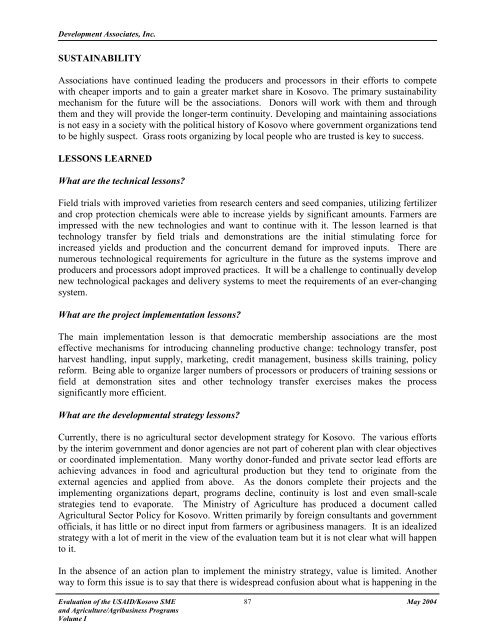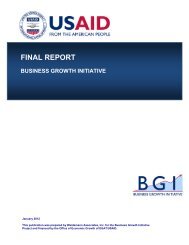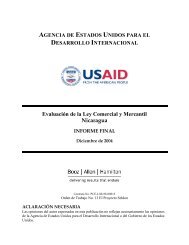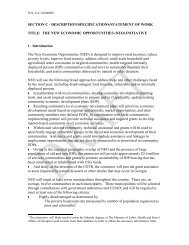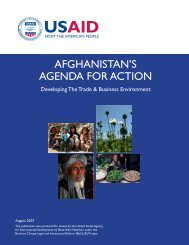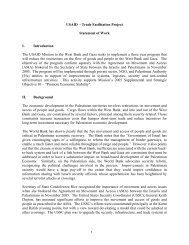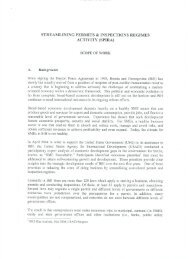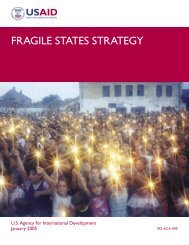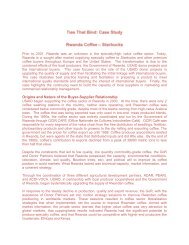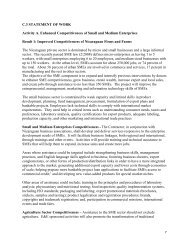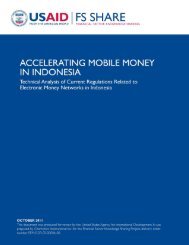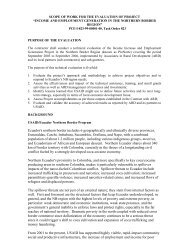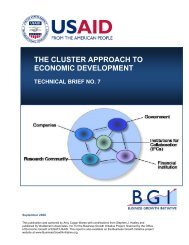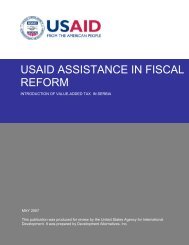Development Associates, Inc.SUSTAINABILITYAssociations have continued leading <strong>the</strong> producers <strong>and</strong> processors in <strong>the</strong>ir efforts to competewith cheaper imports <strong>and</strong> to gain a greater market share in <strong>Kosovo</strong>. The primary sustainabilitymechanism for <strong>the</strong> future will be <strong>the</strong> associations. Donors will work with <strong>the</strong>m <strong>and</strong> through<strong>the</strong>m <strong>and</strong> <strong>the</strong>y will provide <strong>the</strong> longer-term continuity. Developing <strong>and</strong> maintaining associationsis not easy in a society with <strong>the</strong> political history <strong>of</strong> <strong>Kosovo</strong> where government organizations tendto be highly suspect. Grass roots organizing by local people who are trusted is key to success.LESSONS LEARNEDWhat are <strong>the</strong> technical lessons?Field trials with improved varieties from research centers <strong>and</strong> seed companies, utilizing fertilizer<strong>and</strong> crop protection chemicals were able to increase yields by significant amounts. Farmers areimpressed with <strong>the</strong> new technologies <strong>and</strong> want to continue with it. The lesson learned is thattechnology transfer by field trials <strong>and</strong> demonstrations are <strong>the</strong> initial stimulating force forincreased yields <strong>and</strong> production <strong>and</strong> <strong>the</strong> concurrent dem<strong>and</strong> for improved inputs. There arenumerous technological requirements for agriculture in <strong>the</strong> future as <strong>the</strong> systems improve <strong>and</strong>producers <strong>and</strong> processors adopt improved practices. It will be a challenge to continually developnew technological packages <strong>and</strong> delivery systems to meet <strong>the</strong> requirements <strong>of</strong> an ever-changingsystem.What are <strong>the</strong> project implementation lessons?The main implementation lesson is that democratic membership associations are <strong>the</strong> mosteffective mechanisms for introducing channeling productive change: technology transfer, postharvest h<strong>and</strong>ling, input supply, marketing, credit management, business skills training, policyreform. Being able to organize larger numbers <strong>of</strong> processors or producers <strong>of</strong> training sessions orfield at demonstration sites <strong>and</strong> o<strong>the</strong>r technology transfer exercises makes <strong>the</strong> processsignificantly more efficient.What are <strong>the</strong> developmental strategy lessons?Currently, <strong>the</strong>re is no agricultural sector development strategy for <strong>Kosovo</strong>. The various effortsby <strong>the</strong> interim government <strong>and</strong> donor agencies are not part <strong>of</strong> coherent plan with clear objectivesor coordinated implementation. Many worthy donor-funded <strong>and</strong> private sector lead efforts areachieving advances in food <strong>and</strong> agricultural production but <strong>the</strong>y tend to originate from <strong>the</strong>external agencies <strong>and</strong> applied from above. As <strong>the</strong> donors complete <strong>the</strong>ir projects <strong>and</strong> <strong>the</strong>implementing organizations depart, programs decline, continuity is lost <strong>and</strong> even small-scalestrategies tend to evaporate. The Ministry <strong>of</strong> <strong>Agriculture</strong> has produced a document calledAgricultural Sector Policy for <strong>Kosovo</strong>. Written primarily by foreign consultants <strong>and</strong> government<strong>of</strong>ficials, it has little or no direct input from farmers or agribusiness managers. It is an idealizedstrategy with a lot <strong>of</strong> merit in <strong>the</strong> view <strong>of</strong> <strong>the</strong> evaluation team but it is not clear what will happento it.In <strong>the</strong> absence <strong>of</strong> an action plan to implement <strong>the</strong> ministry strategy, value is limited. Ano<strong>the</strong>rway to form this issue is to say that <strong>the</strong>re is widespread confusion about what is happening in <strong>the</strong><strong>Evaluation</strong> <strong>of</strong> <strong>the</strong> <strong>USAID</strong>/<strong>Kosovo</strong> <strong>SME</strong> 87 May 2004<strong>and</strong> <strong>Agriculture</strong>/Agribusiness ProgramsVolume I
Development Associates, Inc.sector <strong>and</strong> what should be happening. All <strong>of</strong> analysts <strong>and</strong> international agencies mention thatagriculture is a major sector in <strong>the</strong> economy <strong>and</strong> employs over 60% <strong>of</strong> <strong>the</strong> workers. There isgeneral agreement that <strong>Kosovo</strong>’s agricultural sector is very inefficient, with low farmproductivity, inferior products, high input costs, weak marketing systems, distorted fiscalpolicies, government inertia on state owned enterprises, etc. What may be <strong>the</strong> single largestsector <strong>of</strong> <strong>the</strong> economy is not contributing much to overall economic growth. Remittances <strong>and</strong>foreign assistance are <strong>the</strong> driving forces in <strong>the</strong> economy right now, along with <strong>the</strong> new homeconstruction sub-sector. Agricultural resources, natural (soil <strong>and</strong> water) <strong>and</strong> human are severelyunder-utilized, many people <strong>and</strong> much l<strong>and</strong> remain idle.In <strong>the</strong> fourth year since <strong>the</strong> peace settlement <strong>and</strong> <strong>the</strong> establishment <strong>of</strong> a multinational interimgovernment, critical issues for agricultural development (where most people make a living)remain unresolved. The fiscal policies regarding import duties <strong>and</strong> value added taxes that stack<strong>the</strong> deck against <strong>Kosovo</strong> agribusinesses <strong>and</strong> producers remain unchanged. The conversion <strong>of</strong>former state-owned agricultural l<strong>and</strong> to private sector use remains stalled in spite <strong>of</strong> viablealternative proposals by <strong>the</strong> Ministry <strong>of</strong> <strong>Agriculture</strong>. There are no viable sectors <strong>of</strong> <strong>the</strong> economyidentified that can lead sustainable growth over <strong>the</strong> next few years. Remittances <strong>and</strong> foreignassistance cannot continue indefinitely. Direct foreign investment does not appear reasonable onany significant scale until <strong>Kosovo</strong>’s political status is resolved with some finality. <strong>Agriculture</strong>has been <strong>the</strong> leading edge sector for national economic growth in more than successful countrythat has emerged from third world status. There are a number <strong>of</strong> serious constraints onagricultural sector growth in <strong>Kosovo</strong> but <strong>the</strong>re are no absolute blocks with possible exceptionpolitical will. With determined effort, policy reforms <strong>and</strong> <strong>the</strong> creation <strong>of</strong> sector-wide strategy forinvestment that had <strong>the</strong> support <strong>of</strong> all parts <strong>of</strong> <strong>the</strong> sector <strong>and</strong> <strong>the</strong> national government, agriculturecould take <strong>the</strong> lead in productivity <strong>and</strong> employment that would drive this economy out <strong>of</strong> <strong>the</strong>doldrums.RECOMMENDATIONS FOR THE FUTURE BASED ON THE LESSONS LEARNED:For activities to stimulate agribusiness growth <strong>and</strong> efficiency in processing, input supply, <strong>and</strong>product marketing that increase incomes, <strong>and</strong> employment. KADP has had good success ingetting <strong>the</strong> poultry sub-sector <strong>and</strong> <strong>the</strong> program deserves to be continued until Kosovar producedeggs recapture <strong>the</strong> market. High quality feed production has been demonstrated to have strongpotential to compete with imports on quality <strong>and</strong> on price.1. For activities to stimulate on-farm production that provides raw material toagribusiness processors <strong>and</strong> concurrently increase farm family employment incomesSupport <strong>the</strong> process <strong>of</strong> acquiring <strong>and</strong> transferring production technologies to producers toincrease yields <strong>and</strong> farm operating efficiency: genetic material, soil fertility management, disease<strong>and</strong> pest control, labor efficiency, <strong>and</strong> post-harvest h<strong>and</strong>ling. These are all essential to <strong>the</strong>overall productivity <strong>of</strong> <strong>the</strong> farm enterprise <strong>and</strong> can be accomplished through well organizedefforts <strong>of</strong> farmer associations, input suppliers, agricultural processors, <strong>and</strong> individual privatetechnical agents who sell services to producers <strong>and</strong> processors.<strong>Evaluation</strong> <strong>of</strong> <strong>the</strong> <strong>USAID</strong>/<strong>Kosovo</strong> <strong>SME</strong> 88 May 2004<strong>and</strong> <strong>Agriculture</strong>/Agribusiness ProgramsVolume I
- Page 1 and 2:
FINAL REPORTVOLUME IEVALUATION OF T
- Page 3 and 4:
FOREWORDThis report requires some i
- Page 5 and 6:
Development Associates, Inc.IPMIRIR
- Page 7 and 8:
EXECUTIVE SUMMARYI. FINDINGS1. USAI
- Page 9:
Development Associates, Inc.• Kos
- Page 12:
Development Associates, Inc.land-sc
- Page 16 and 17:
Development Associates, Inc.become
- Page 18 and 19:
EVALUATION OF THE USAID/KOSOVO SME
- Page 20 and 21:
Development Associates, Inc.KOSOVO
- Page 22 and 23:
Development Associates, Inc.A. GENE
- Page 24 and 25:
Development Associates, Inc.3. Perc
- Page 26 and 27:
Development Associates, Inc.busines
- Page 28 and 29:
Development Associates, Inc.provide
- Page 30 and 31:
Development Associates, Inc.Factor
- Page 32 and 33:
Development Associates, Inc.The tab
- Page 34 and 35:
Development Associates, Inc.3. How
- Page 36 and 37:
Development Associates, Inc.Fees mi
- Page 38 and 39:
Development Associates, Inc.Clearly
- Page 40 and 41:
Development Associates, Inc.B. CERT
- Page 42 and 43:
Development Associates, Inc.Financi
- Page 45 and 46:
Development Associates, Inc.The res
- Page 47 and 48:
Development Associates, Inc.more ti
- Page 49 and 50:
Development Associates, Inc.approxi
- Page 51 and 52:
Development Associates, Inc.company
- Page 53 and 54: Development Associates, Inc.Lessons
- Page 55 and 56: Development Associates, Inc.to esta
- Page 57 and 58: Development Associates, Inc.In ligh
- Page 59 and 60: Development Associates, Inc.the con
- Page 61 and 62: Development Associates, Inc.1. Busi
- Page 63 and 64: Development Associates, Inc.As the
- Page 65 and 66: Development Associates, Inc.Only th
- Page 67 and 68: Development Associates, Inc.2.3 Pro
- Page 69 and 70: Development Associates, Inc.B. Link
- Page 71 and 72: Development Associates, Inc.3.6 B2B
- Page 73 and 74: Development Associates, Inc.has ass
- Page 75 and 76: Development Associates, Inc.A) Koso
- Page 77 and 78: Development Associates, Inc.KOSOVO
- Page 79 and 80: Development Associates, Inc.IMPLEME
- Page 81 and 82: Development Associates, Inc.quantit
- Page 83 and 84: Development Associates, Inc.RECOMME
- Page 85 and 86: Development Associates, Inc.represe
- Page 87 and 88: Development Associates, Inc.Objecti
- Page 89 and 90: Development Associates, Inc.4. Work
- Page 91 and 92: Development Associates, Inc.(300,00
- Page 93 and 94: Development Associates, Inc.surroun
- Page 95 and 96: Development Associates, Inc.This ca
- Page 97 and 98: Development Associates, Inc.1. Majo
- Page 99 and 100: Development Associates, Inc.KOSOVO
- Page 101 and 102: Development Associates, Inc.Targets
- Page 103: Development Associates, Inc.Weaknes
- Page 107 and 108: Development Associates, Inc.KOSOVO
- Page 109 and 110: Development Associates, Inc.IFDC-KO
- Page 111 and 112: Development Associates, Inc.capacit
- Page 113 and 114: Development Associates, Inc.The fee
- Page 115 and 116: Development Associates, Inc.Poultry
- Page 117 and 118: Development Associates, Inc.TARGETS
- Page 119 and 120: Development Associates, Inc.Inconsi
- Page 121 and 122: Development Associates, Inc.RECOMME
- Page 123 and 124: Development Associates, Inc.IMPROVI
- Page 125 and 126: Development Associates, Inc.high co
- Page 127 and 128: Development Associates, Inc.early d
- Page 129 and 130: Development Associates, Inc.Table 1
- Page 131 and 132: Development Associates, Inc.farmer
- Page 133 and 134: Development Associates, Inc.P.O. 2:
- Page 135 and 136: Development Associates, Inc.The lac
- Page 137 and 138: Development Associates, Inc.Based o
- Page 139 and 140: Development Associates, Inc.SUSTAIN
- Page 141 and 142: Development Associates, Inc.markets
- Page 143 and 144: Development Associates, Inc.decentr
- Page 145 and 146: Development Associates, Inc.4. Have
- Page 147 and 148: VOLUME IIEVALUATION OF THE USAID/KO
- Page 149 and 150: Development Associates, Inc.Exhibit


